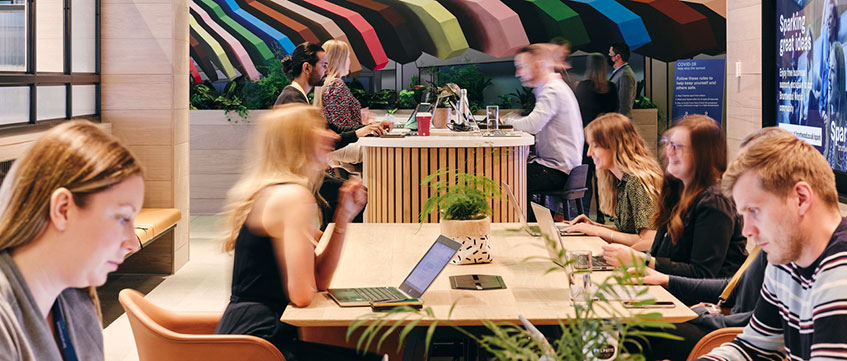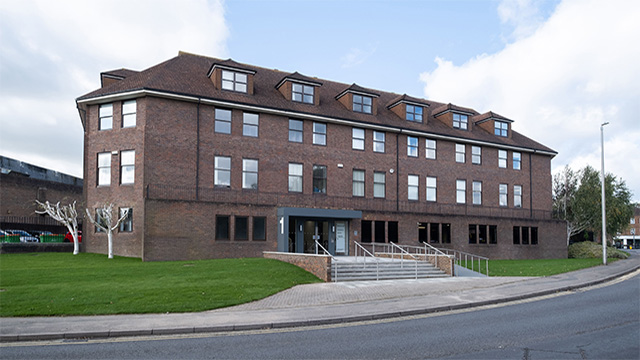Bruntwood pushes cluster strategy with Pioneer expansion
Bruntwood Works is set to accelerate the expansion of its Pioneer brand, including looking at out-of-town locations as well as its core city centres.
The developer launched the Pioneer programme as a way of providing “future-facing” workspace in cities, pitching its sites as focused on wellbeing, biophilia, technology, sustainability, amenity and art.
From one site in Manchester valued at around £50m, the offering has grown to a £200m portfolio comprising three sites in the city and one in Liverpool. Now sites away from the larger cities are on the radar.
Bruntwood Works is set to accelerate the expansion of its Pioneer brand, including looking at out-of-town locations as well as its core city centres.
[caption id="attachment_1142644" align="alignright" width="200"] Andrew Cooke[/caption]
The developer launched the Pioneer programme as a way of providing “future-facing” workspace in cities, pitching its sites as focused on wellbeing, biophilia, technology, sustainability, amenity and art.
From one site in Manchester valued at around £50m, the offering has grown to a £200m portfolio comprising three sites in the city and one in Liverpool. Now sites away from the larger cities are on the radar.
“We are looking at some regional, out-of-town buildings that could become Pioneers,” said Andrew Cooke, operations director at Bruntwood and strategic director at Bruntwood Works. “There are obviously challenges to that in terms of where they’re located, price differentials and things like that. But we feel that if we can add [the Pioneer product] to our regional portfolio, customers will absolutely benefit and it will be as popular as it is in the city centre.”
Cooke added: “We noticed that customers were moving to more quality space, including amenity space wrapped around standard leases and co-working spaces, hospitality and arrival experience, and the wellness facilities. That idea started to germinate pre-pandemic, and of course throughout the pandemic it has only accelerated.”
The right blend
Not every building can become a Pioneer site, Cooke said – in some, adding enough amenity would mean too great a sacrifice of lettable space, denting returns. But in a city such as Manchester, even non-Pioneer sites can add to what he called a “Pioneer cluster” that tenants can move across.
That is the case with King’s House, for which Bruntwood recently gained planning consent to redevelop 38,000 sq ft of workspace and amenity. The building sits in a cluster of Bruntwood-owned properties anchored by Blackfriars House, the first Pioneer building in Manchester, which has its own podcast studio, a 70-seat auditorium, a lounge area with fireplaces for less formal meetings, an independent coffee shop and a rooftop restaurant.
Also nearby is Alberton House, a consultation for the redevelopment of which is underway and where Bruntwood hopes to deliver 200,000 sq ft of new workspace.
The customers of all buildings within the cluster can use the hospitality and wellbeing services available in the other buildings. Single-use spaces are becoming less relevant for Bruntwood customers, Cooke said.
“Different uses in all our spaces are creating different reasons to come to our buildings,” he said. “We don’t want to create a space where a customer just arrives in an office reception like they would have done a few years ago, certainly not in a Pioneer building. So a blending of retail and leisure into office space has been absolutely key for us.”
That offering has helped Bruntwood to pitch users of its entry-level products a move into fully serviced, leased spaces. “What we’re finding is that customers are coming to our buildings now more to use products like pay-as-you-go to simply secure a desk for the day or for a few hours or whatever it might be,” said Cooke. “What we’re doing then is introducing them to Bruntwood Works and using those entry-level products to move customers further up.”
Confidence returning
Tenants are being hit by uncertainty at every turn, Cooke acknowledged, including the coronavirus pandemic, the war in Ukraine, supply chain issues and Brexit. But most are now building flexibility into their strategies in response, and a growing confidence is being seen in a return to the traditional workplace.
“Customers have actually seen the value of bringing their teams back into space where they can keep them healthy, happy and productive, and make sure that they’re working collaboratively with each other, within the right space, with the right technology and services wrapped around them,” he said. “And that’s feeding through into what we’re seeing in our footfall figures.”
Confidence is also returning among smaller, independent businesses taking retail and leisure space from the group, with growing demand for smaller retail spaces that are currently being let more quickly than larger shops.
“We’re seeing entrepreneurial independent retail and leisure operators coming back to the market more quickly than some of the larger chains, which naturally may have national sites closed down,” said Cooke. “What we’re also seeing is challenges that those customers are facing, such as access to finance, so we are having to be much more supportive in how we design and develop our spaces.”
Cooke said the company aims to help companies across all types of space to broaden their network by giving them access to Bruntwood’s portfolio. “We have a really deep network, not only in the office sector but in retail. In Manchester, we can give these independents access to a wider network. And that’s actually key for us.
“If you look at global events over the past few years, we’ve just got to continue accepting that it is a constantly changing environment, and anything that we can do to help that in the products that we develop and services we offer, the spaces we design, we will continue to do.”
To send feedback, e-mail evelina.grecenko@eg.co.uk or tweet @Gre_Eve or @EGPropertyNews
Photos courtesy of Citypress











